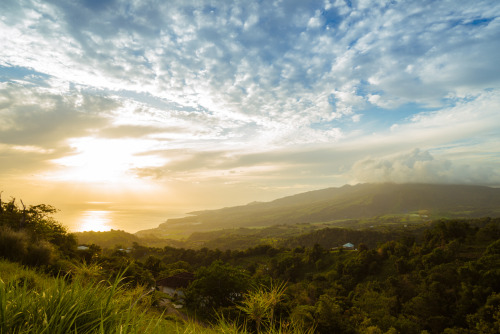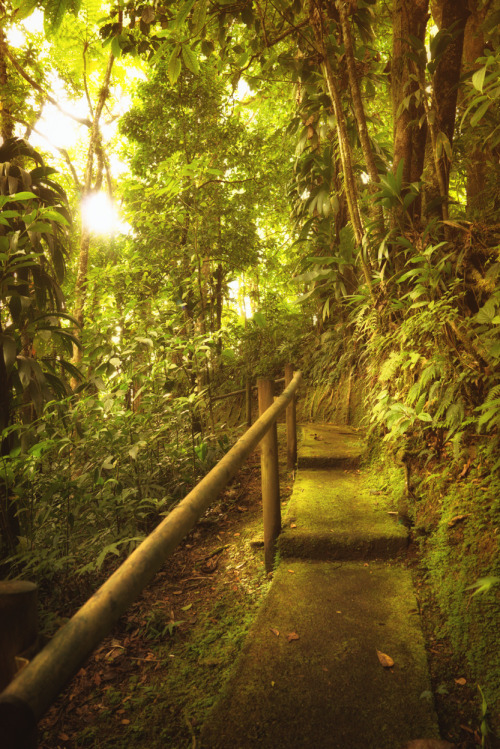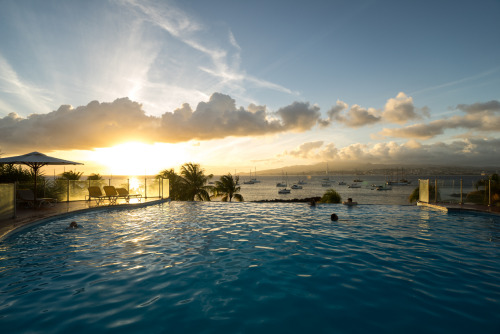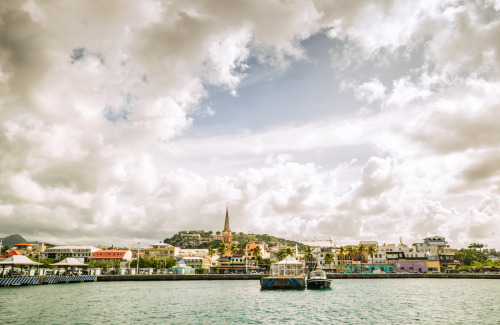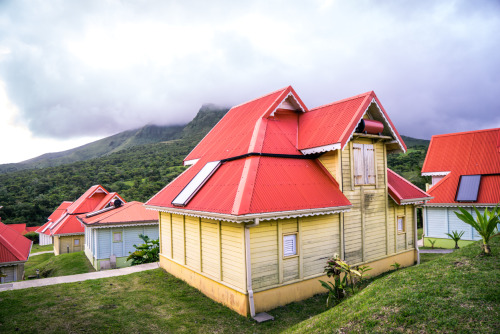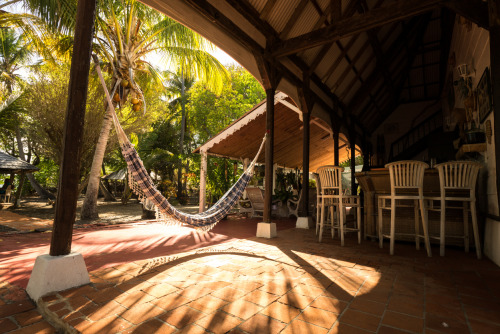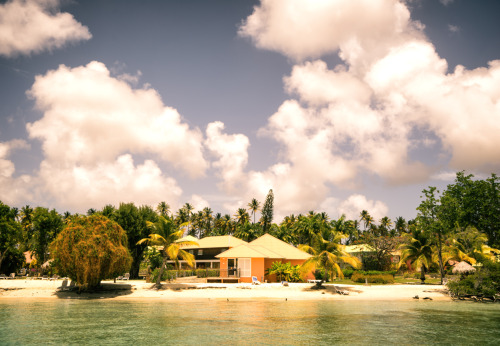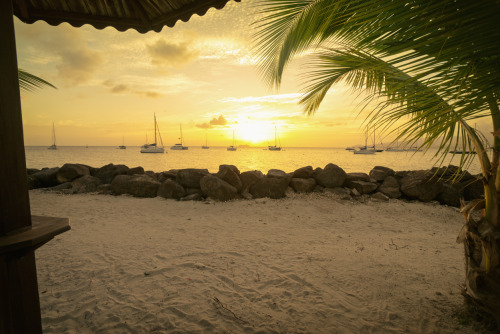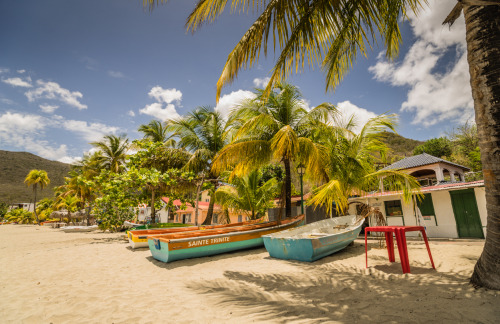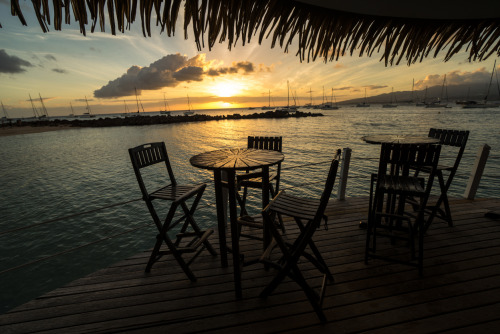Martinique - The French Caribbean - A Photo-Tour
Everybody has a magical place or a series of magical places that they conjure up on the backs of their eyelids before going to sleep. The images linger in a never-ending slideshow revealing locales that symbolize a bevy of hopes and desires.
One of my magical places has always been a tropical locale.
During my darkest moments when the rest of the world seemed bleak and heartless, I would close my eyes as my head sank into my pillow and imagine laying in a hammock on a beach surrounded by palm trees with the sound of ocean waves gently crashing to shore playing in the background like a lullaby.
Travel is one of the instances in life where you get to visit the locations you have conjured up for years, the locations that help you get through the worst of times.
And that’s one of the many reasons that travel is such a life-altering experience.
Traveling to Martinique this year was the first time in my life I had ever stepped foot into a world that so closely resembled the place I had imagined as I drifted off to sleep.
I spent a week on the island of Martinique and this photo-set and subsequent post will barely touch the surface of everything I experienced. I plan on going more in-depth in future posts.
This post is more of a highlight reel of some of what I experienced while exploring the island of Martinique. And I think that’s a great introduction to Martinique for anyone who is reading this right now who has never heard of Martinique.
I had never really heard a lot about Martinique prior to heading there a few months ago. I had distant memories of people talking about visiting the island for a few hours on stopovers during cruises. But other than that, my knowledge of the island was limited in its scope.
Martinique is an island in the Caribbean Sea that is located north of Saint Lucia, northwest of Barbados, and south of Dominica. It’s one France’s overseas regions and is home to around 380,000 inhabitants. Because it is a region of France, the official language of the island is French although many of the inhabitants speak Antillean Creole.
With a stunningly diverse geography, it’s a fascinating place to visit. It’s not for every traveler but it has its pros and cons which I will get into at the end of this post.
Let’s explore!…
I stayed at for the entire duration of my stay. The hotel is located in a part of Martinique known as Les Trois-Îlets. This was the view from my room which was located right on the beach:
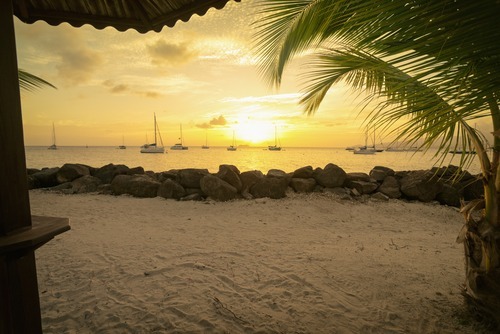
And this is their incredible infinity pool which overlooks the Caribbean Sea:
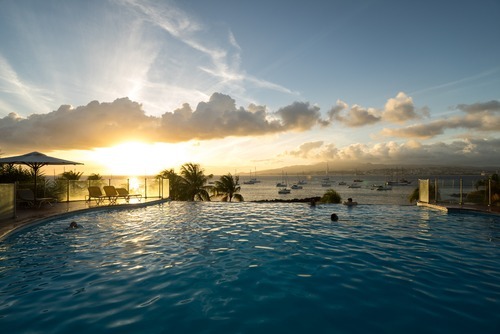
The first night I arrived, myself and the 4 other members of press who were a part of my week-long adventure were treated to drinks at Coco Bar, the hotel’s bar which sits in the Caribbean Sea and is accessible by a foot-bridge.
This was the sunset view from Coco Bar:
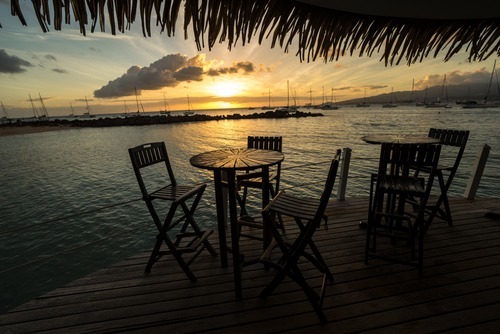
Martinique is known as “the island of flowers”. The week that I stayed there I couldn’t help but notice that while there certainly were beautiful flowers on the island, the island wasn’t brimming with flowers as I had imagined it would be.
It turns out that Columbus is the originator of the “the island of flowers” phrase. Columbus first landed on the island in 1502. There are reports that prior to his “discovery” of the island (in quotes for obvious reasons), that the island was known as “the island of iguanas”. However, Columbus referred to the island as Mandinina or “the island of flowers”. The name eventually evolved into Martinica and then Martinique.
That said, there are a few places on the island that are full of gorgeous tropical flowers like this area at , the former sugar estate of Empress Josephine :
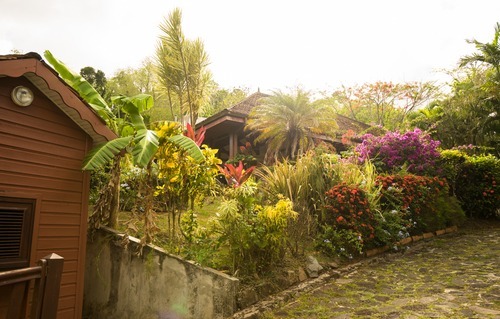
Accessible only by boat, Ilet Oscar is a tiny island on the Atlantic Ocean side of Martinique. It is home to a Creole house which functions as a bed and breakfast for four guests. It faces a beautiful blue lagoon:
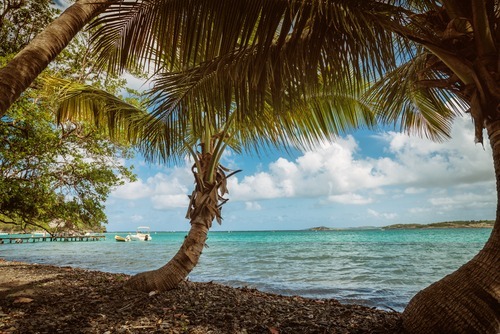
And it is the location of this wonderful hammock that hangs under palm trees. To the right is the guest house, and in the distance to the left are tables for guests to enjoy French-Creole cuisine prepared by the guest house’s owners:
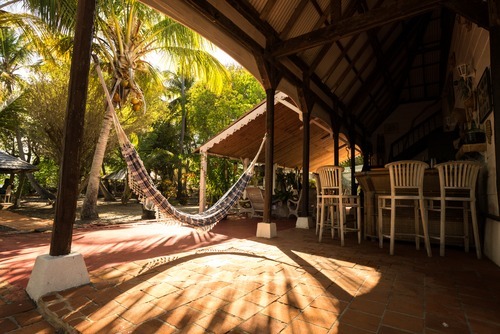
I spent quite a bit of time on boats while I explored Martinique. Martinique is probably best explored by boat. Not only is there a huge array of water activities that can be enjoyed like paddle-boarding, scuba-diving, snorkeling, but it’s a great way to view the towns that pepper the coasts of Martinique.
This is a coastal town shortly before a rainstorm:
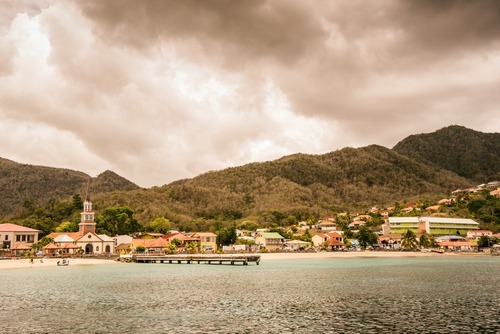
And this is Martinique’s capital city, Fort de France:
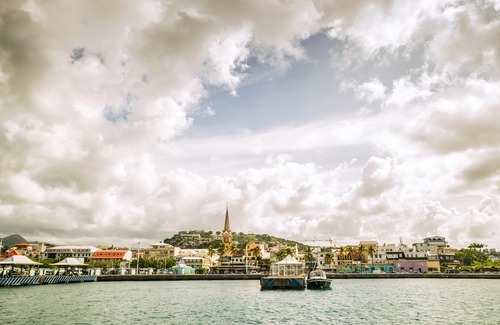
Martinique’s Club Med resort: :
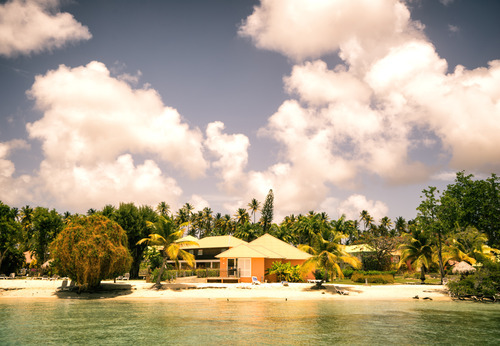
Coastal houses in dramatic sunlight as storm clouds form overhead:
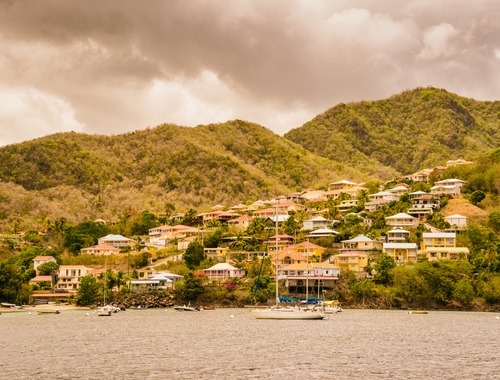
One of the reasons that I was in Martinique was to experience and photograph the annual Yole Boat Race (Yole Rondes).
Sailing vessels can be traced back to the Arawak Indians who populated the island thousands of years ago. Thousands of years of perfecting the Arawak’s original fishing vessels produced the Yole boat.
The annual boat race is a big deal in Martinique as Yole racing is Martinique’s number one sport. The island rallies behind their favorite boats and engages in a festival that features Yole racing.
Yole vessels are long, hollowed out tree trunks and are propelled by sailors who literally use their body weight to steer and accelerate the boat. The sailors hang off the oars like so:
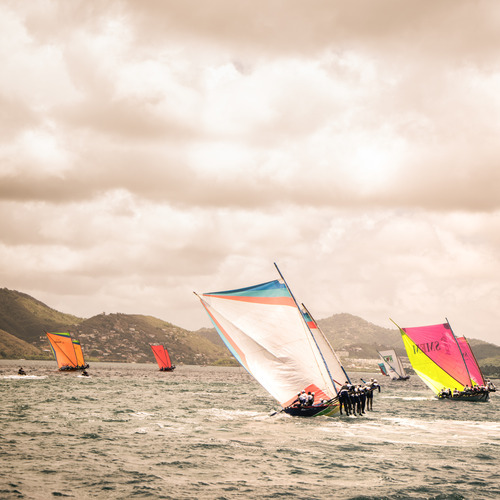
It’s fun to watch the sailors race along the coast of Martinique:

There is a Carnival type of atmosphere on the beaches. Musicians play music and dancers mingle with yole racing observers celebrating:
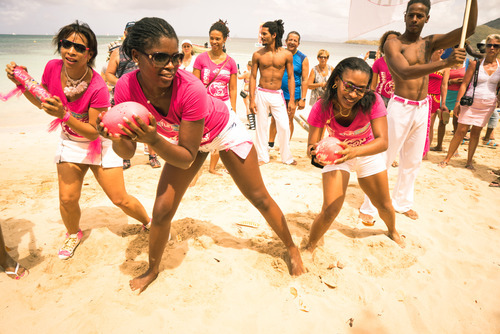
The cuisine on Martinique is a fusion of French cuisine and Creole cuisine. One of the most interesting out-of-the-way places that I ate a meal was at Petibonum located in Le Carbet on a beach:
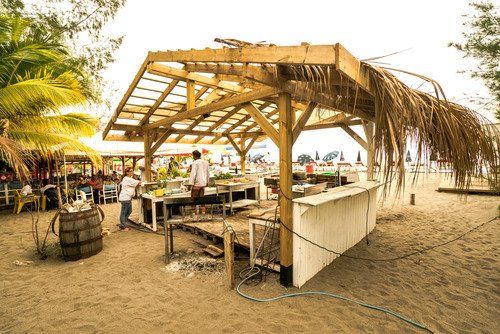
The owner is a character you would expect to find on an episode of (I am shocked that Bourdain has never been to Martinique!).
Guy Ferdinand is a larger-than-life figure who wears hot pants while he cooks fresh seafood and charms locals. Here he is serving me freshly picked mango dipped in dark chocolate:
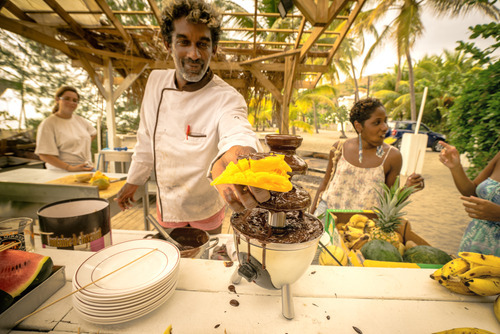
One of my favorite adventures on the island involved a 4x4 excursion deep into the rainforests of Martinique and up to the base of Mount Pelee (more on that soon).
My guide had grown up on Martinique and knew almost every single plant on the island. She would stop along the road to pick herbs and flowers for us to touch, smell, and sometimes taste. Many herbs were local health remedies.
Because we were in a 4x4, we were able to navigate the rugged roads that ran into the sugarcane fields. Sugarcane on the island is widely used for production of rum and gets utilized by the distilleries on the island.
Here is one of the sugarcane fields we drove through:
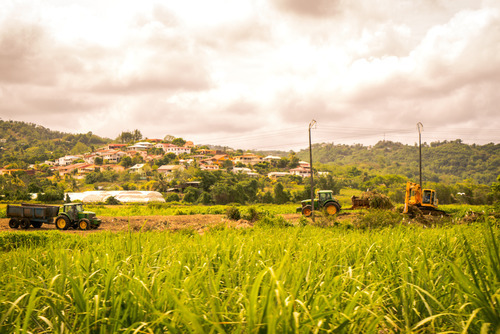
As we drove north and climbed in elevation, we saw views like this:
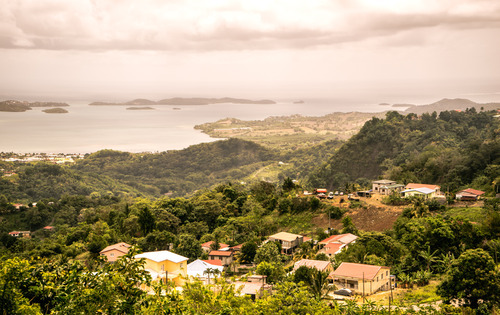
We eventually made it up to the Emerald Domain, an area populated by Martinique’s lush rainforests. Walking along the mossy paths granted fantastic views like this one:
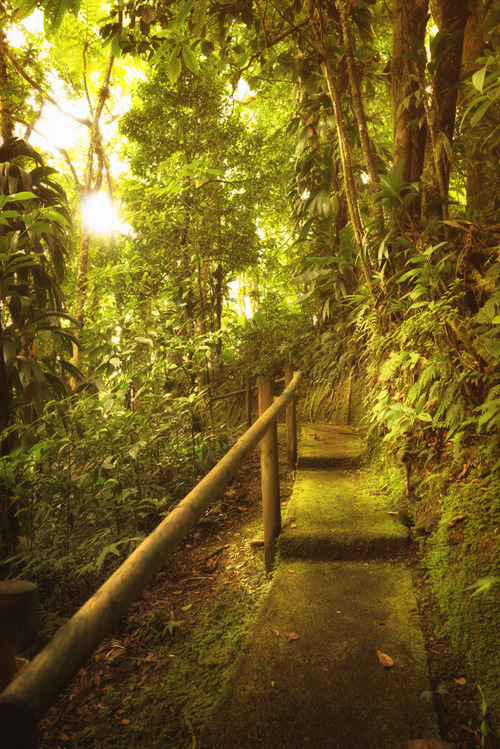
While we were in the northern part of Martinique, we also drove to the base of Mount Pelee to a town called Morne Rouge which sits among the clouds that seem to perpetually linger along the peak of Mount Pelee:
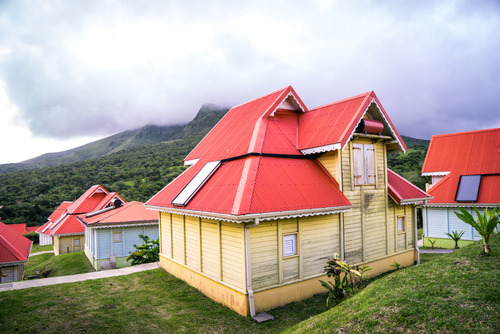
Mount Pelee has quite a past and many locals will assure you that it is a sleeping volcano. And it is. It has been sleeping for over a hundred years.
Its major eruption in 1902 has been dubbed the worst eruption of the 20th century. It had a negative impact on the island completely decimating the town of Saint Pierre which was situated in its path and was Martinique’s capital city at the time. 30,000 people died.
It is being watched by volcanologists and geophysicists constantly though which is a great thing and a fact that locals are eager to share.
Here it is from a beautiful vantage point along a mountain road:
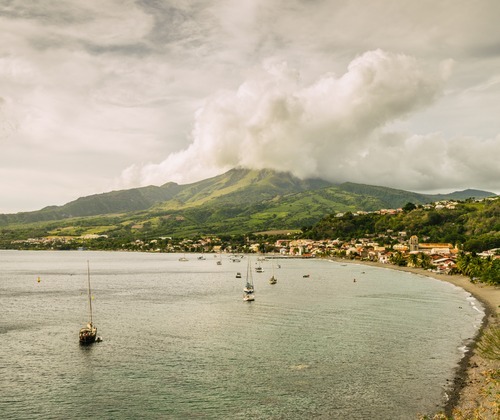
Because of the volcanic activity on the island, Martinique has volcanic, black sand beaches. Black sand consists of lava fragments and volcanic materials.
Here is a black sand beach nestled in a cove, accessible mainly by boat:
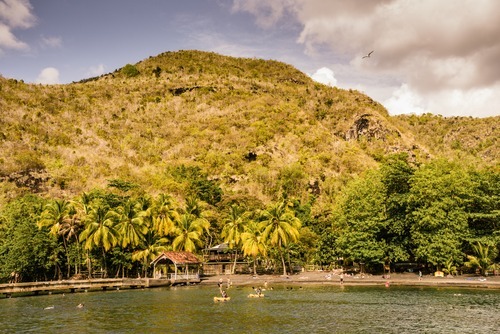
As we drove back to Fort de France to catch the ferry boat back to Les Trois-Îlets, we passed one of the most beautiful lookouts on Martinique.
The view is of the Caribbean Sea in the distance at sunset with Mount Pelee surrounded by clouds to the right and houses on hills in the foreground:
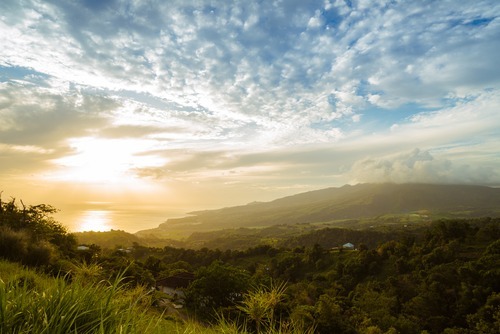
—
Some notes about Martinique:
1. “More French than France”. This is something I stated to a few people while I was visiting France recently when they inquired about Martinique. This statement can be taken as a pro and a con at the same time depending on what type of traveler you are.
What do I mean by Martinique being more French than France? Martinique is a primary destination for French travelers since its main currency is the Euro and since it is a region of France. Many of the local businesses and a large portion of Martinique’s tourism is geared towards its tourism from France. It’s rare to find tourists from other parts of the world. The cuisine is French mainly with some Creole fusion.
The major language spoken on the island is French. Signs are in French and English tends to be rarely spoken even by business and restaurant owners. It’s easier to navigate larger cities of France due to France’s urban centers being full of English-friendly people than it is to navigate most of Martinique if you are not open to learning French.
This can be a good thing if you are a traveler looking for a certain kind of escapism and perhaps even an escape from the British Caribbean which tends to pander to English speaking tourists. Enjoying a tropical locale with a diverse geographical setting that also features an immersion into French culture along with its deep Creole roots is certainly appealing.
If you are a traveler who is not interested in immersing in another culture entirely while in a tropical locale, Martinique has a bit of a way to go before it would suit your type of travel. And in fact, I think it’s great that there is a place in the Caribbean that is so entrenched in French and Creole culture.
2. Eco-tourism vs. All-inclusive resorts. For many people, the Caribbean conjures up images of all-inclusive resorts in their minds: drinks by a large pool, snorkeling at leisure, and spa-like activities.
Martinique does have one 5 star hotel: and an all-inclusive Club Med resort called . However, aside from these hotels and resorts, the rest of the hotels on the island are largely boutique hotels, guest houses, 4 star hotels, and hostels.
What Martinique has is a growing love for sharing its unique brand of ecotourism. As I showed in my photo-set above, Martinique has a rather diverse geography which begs for exploration.
With rainforests, water great for scuba-diving, and quite a bit of preserved nature, Martinique is unique when it comes to island destinations of the Caribbean. This is a plus for travelers who are into ecotourism and rugged exploration. It’s a prime destination for foraging adventures as well as I indicated above when I shared my experience with the 4x4 excursion.
3. Star ratings and expectations. I feel the need to make a note about the hotels on the island especially. Many of the hotels on the island are rated at 4 stars and 3 stars. One needs to understand that the star ratings on Martinique are relative to Martinique itself and not relative to other comparable 4 star hotels around the world, for example.
Martinique is a beautiful location. The hotel I stayed at for a week ( was perfectly fine and boasted one of the best views I have ever had from any hotel:
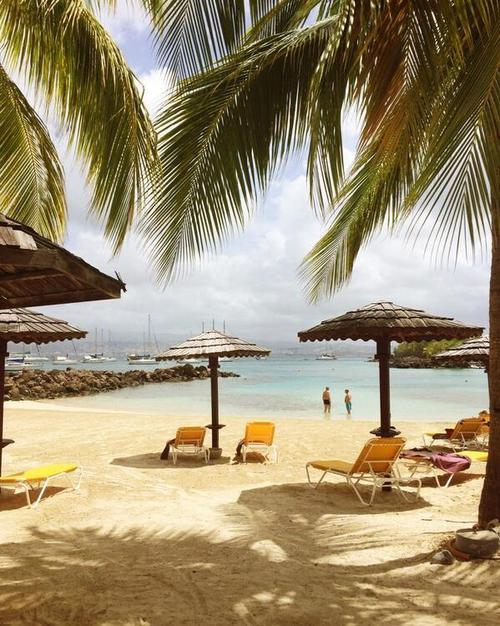
It is listed as a 4 star hotel which was a fact that seemed to shock a number of travelers I spoke with about the hotel due to the fact that 4 star hotels in North America or even in Europe tend to be a bit more elevated in terms of the amenities they feature. In fact, this hotel would probably not meet the 4 star rating if it were elsewhere. However, on the island itself, it definitely is a stand-out.
And I have found that this applies to many of the properties on the island. This is something to consider when choosing a property to stay at if you plan on visiting Martinique. Would I stay at Hotel Bakoua again? Yes. Absolutely. And I would ask for a similar room with a similar view :).
4. The food. Because Martinique is steeped in French culture, French cuisine is prevalent. Martinique’s Creole culture is also prevalent in the cuisine.
Martinique’s restaurant world is also fortunate to have a bevy of fresh, locally sourced ingredients at their disposal which makes for some of the most wonderful dishes.
This is a great place to be a foodie especially if you are into locally grown and sourced food.
—
I am happy I got to experience Martinique. It’s a unique part of the Caribbean and its cultural influences make it endlessly fascinating to explore.
I hope you enjoyed my photo-tour, recap of my experiences, and my thoughts about Martinique!
—
Looking for these (and more) Martinique photos to view larger? Here you go (click or tap on each photo to view larger):
–
Interested in viewing all of my France-related posts so far? Here they are:
—
Incredible amounts of gratitude to:
The island of Martinique for graciously hosting me for an entire week.
And, the official France tourism agency, who you can find here on Facebook who were instrumental in arranging and coordinating all arrangements for this trip.
—-
View: , , , ,, or ask for help.

